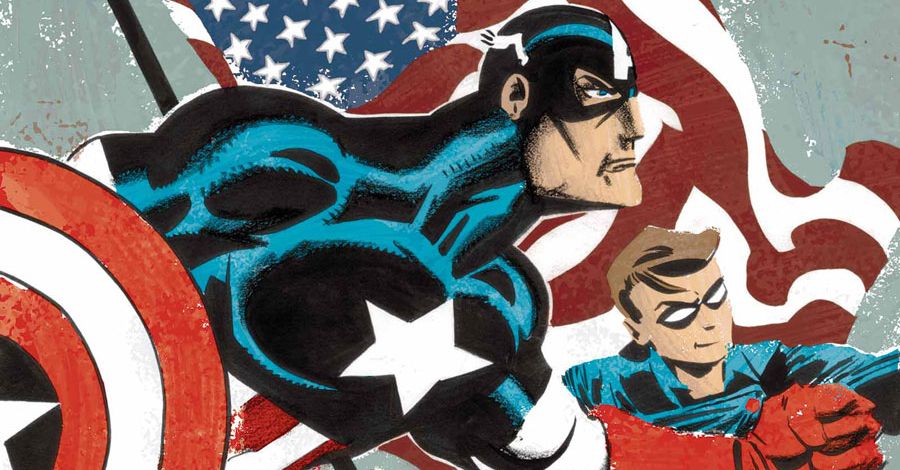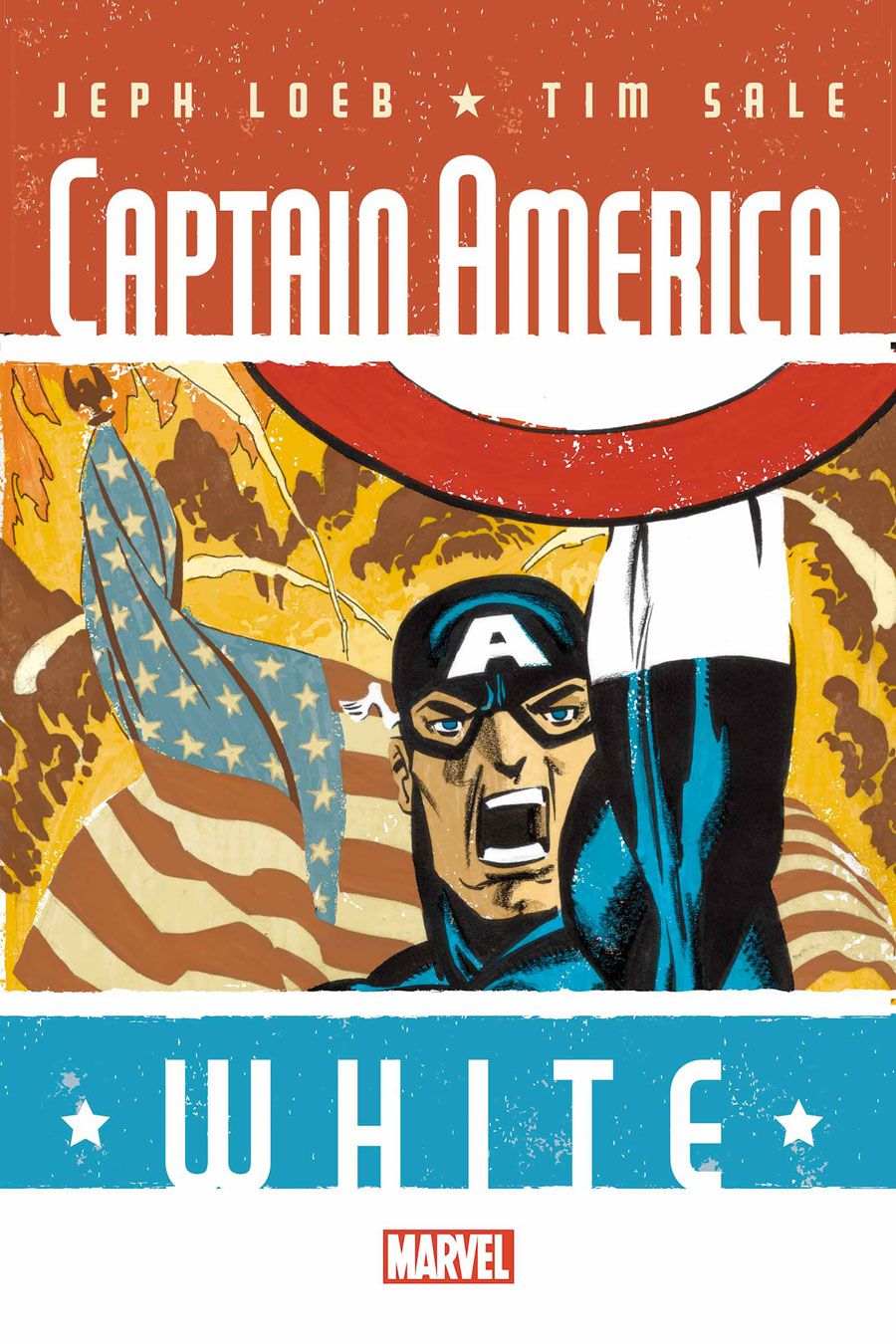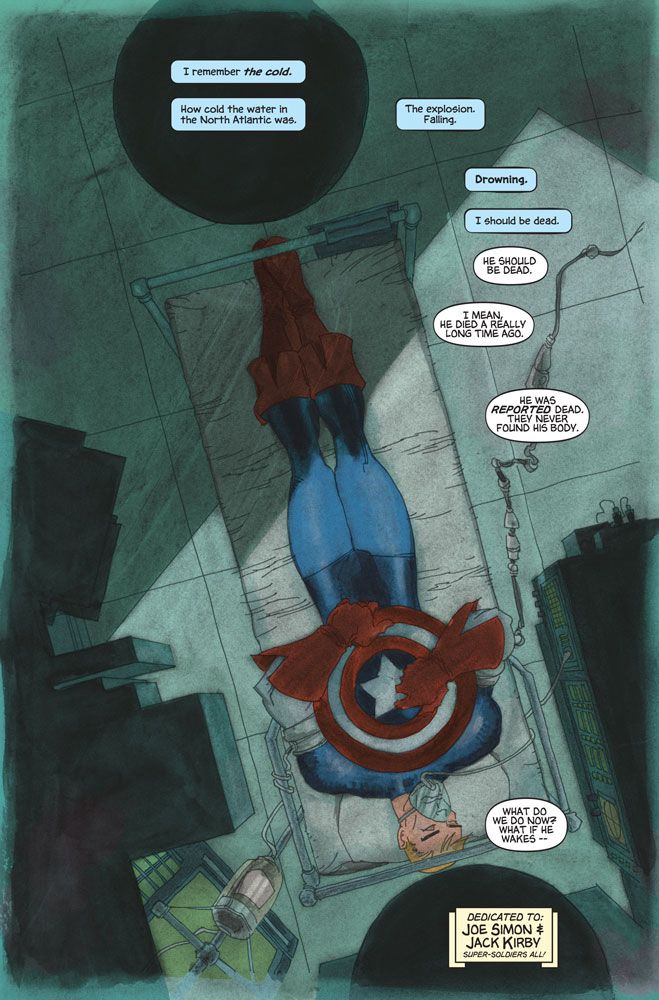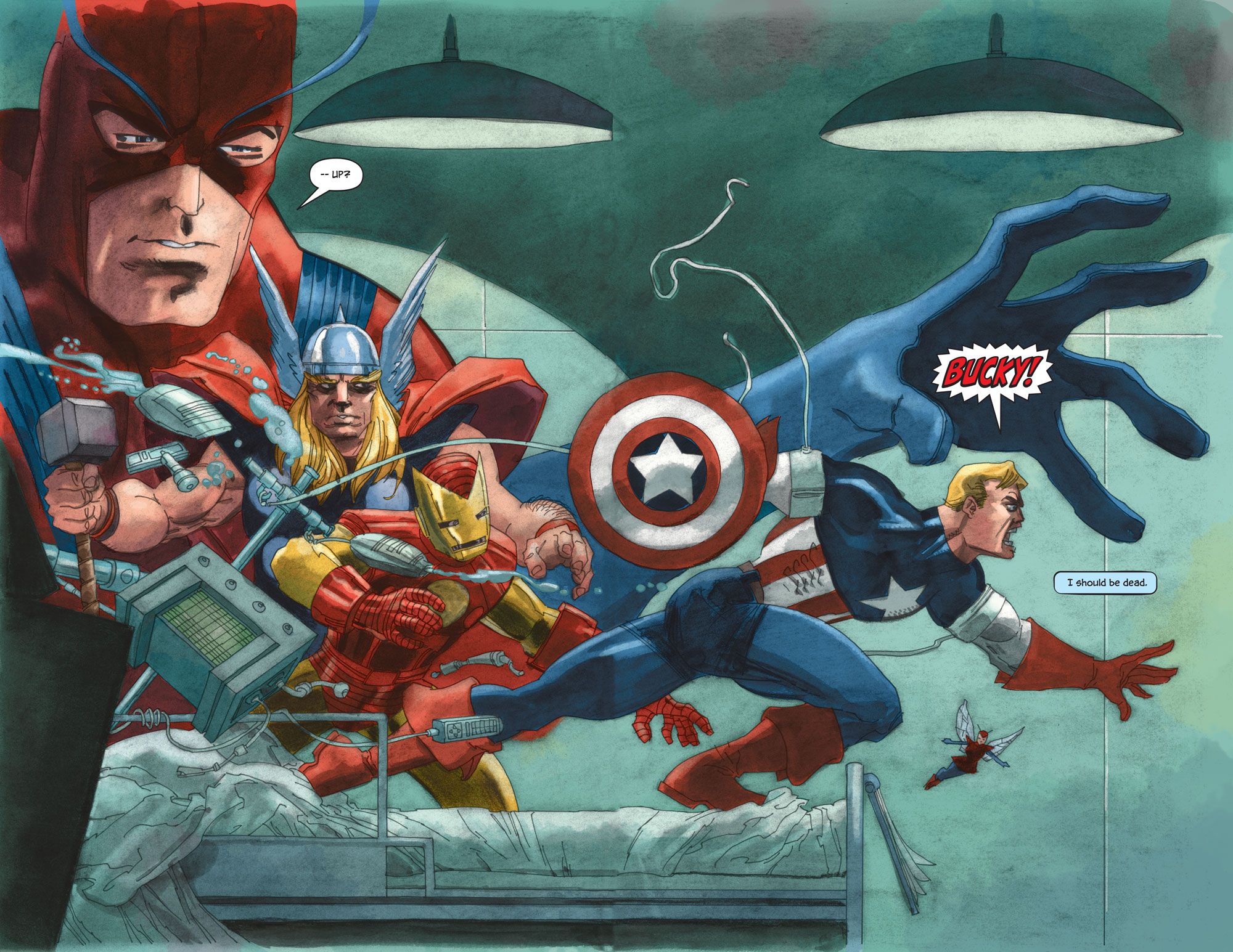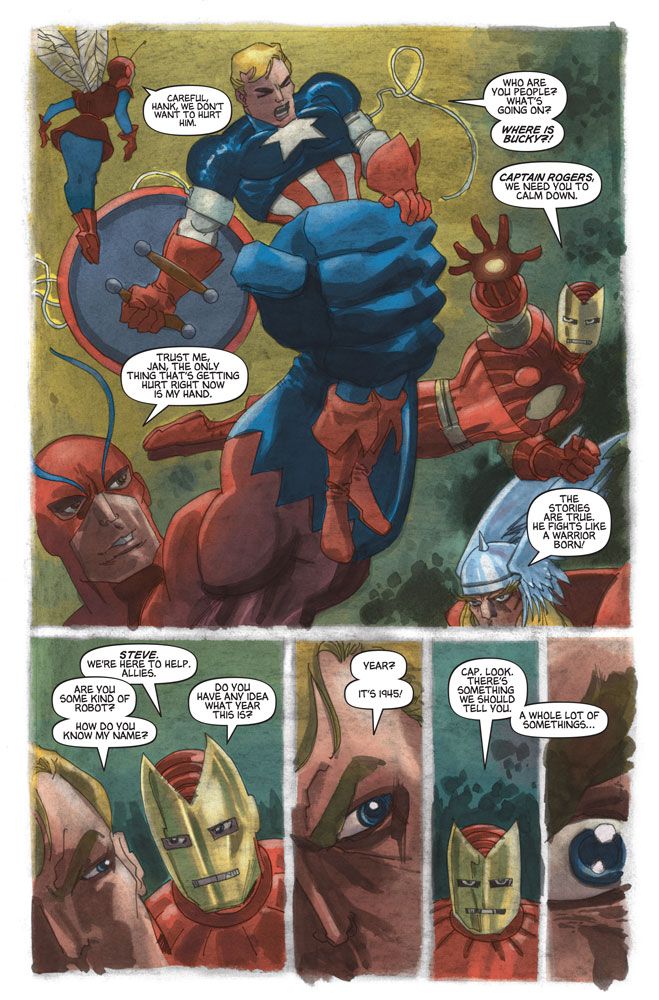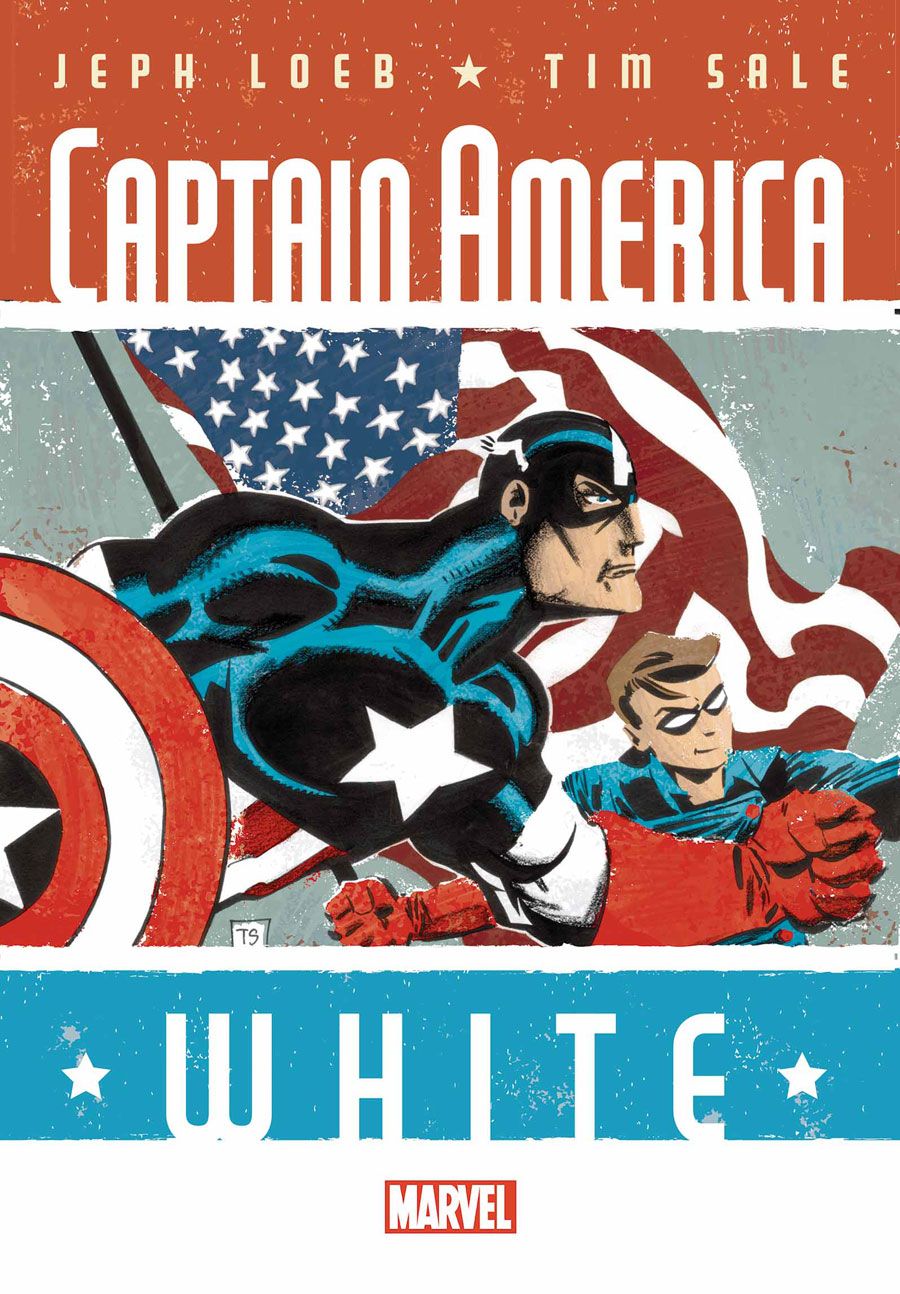"Captain America: White" by Jeph Loeb and Tim Sale was first announced in March 2008 at the now-defunct Wizard World Los Angeles convention. It was an era before the rise of digital comics, before the first Marvel Studios film was released, even before the Obama administration -- but after more than seven years of delays, "Captain America: White" #1 is on sale today from Marvel Comics.
The five-issue miniseries is the latest in Loeb and Sale's "color books," the colloquial name for the duo's nostalgic series of Marvel collaborations that started in 2001 with "Daredevil: Yellow" and continued with "Spider-Man: Blue" and "Hulk: Grey." Like those earlier books, "Captain America: White" focuses on a hero looking back on someone he's lost -- in this case, Cap mourning the loss of his friend and sidekick Bucky, in the pre-Winter Soldier era -- with the bulk of the story taking place in Marvel's World War II, complete with the Howling Commandos and a threat from the Red Skull.
CBR TV @ SDCC: Loeb on "Captain America: White," "Daredevil" & Expanding Marvel TV
It's been a long time since readers have seen new work from the acclaimed pair, in part due to Loeb's day job as Head of Marvel Television. Whether or not "Captain America: White" would ever see the light of day became something of an open question among fans, as only an issue #0 -- originally released in 2008 and reprinted inside the freshly released #1 -- ever made it into stores.
Now "Captain America: White" has arrived, and to mark the occasion, CBR Executive Producer Jonah Weiland spoke with both Loeb and Sale about how they view the story in 2015, reigniting their creative partnership, what their shared future may hold -- and what contributed to the eight-year delay.
CBR News: We're going to start with what has to be the most obvious question, and I'm going to pose it to you, Jeph -- why the seven-year delay on "Captain America: White"?
Jeph Loeb: Eight.
Well, the first interview I found on it was with us in 2008, published during Wizard World LA. How things have changed in those last eight years.
Loeb: Well, that was the reason. I blame Wizard World. [Laughs] This is a project which was always very important me and Tim, and we're very glad that it's ready to come out.
Tim, when I spoke with you at Emerald City Comicon last year, you said that much of it had actually been done. How much did you really have to do to complete it? And talk about your artistic process here, because it sounds like a lot of it was maybe done eight years ago -- maybe a lot of it was done more recently?
Tim Sale: No, no, it was more piecemeal than that. But at the time we talked, yeah, an awful lot of it was done. I don't remember, at that point, exactly how much. But because of various reasons, there were delays, so it just took a while. It was challenging to do.
Why was it challenging? What was challenging about this project?
Sale: Well, one of the things for me was that it took me a while to get my head around how much minute accuracy that so many people who follow World War II expect out of these kind of things. I would run into artists like Tony Harris who would die to do it because they knew every damn thing about it. I had to relax with the fact that that wasn't going to be what I was going to do.
PREVIEW: Loeb & Sale Reunite in "Captain America: White" #1
Loeb: Tim, you can be very conscious that there are guys who spend an entire day working to make sure that the rivets are right. And I've always found that your artwork works best when it lives in what I like to refer to as a "Tim Sale-ian World." I'll give you a perfect example. When I first started working with Jim Lee on "Hush," I said, "Is there anything you don't want to you draw?" And he said, "Yeah, don't give me a kitchen." And I'm thinking to myself, Jim can write, he can draw a motorcycle where every single piston works. And there are guys who do that. Their machinery has to be exactly right. He goes, "I look at Tim's kitchens and I'm so intimidated by what it is that he does." Tim and I laugh because I always say to him is that a Cuisinart or is that a bucket?
Sale: It was a carburetor.
Loeb: [Laughs] Exactly, it was a carburetor. I think what Jim was saying -- and I hate speaking for him, since he's not in this interview -- is that what Tim does so brilliantly is capture the flavor of it without it having to be down to the last rivet of it.
Sale: Well, thanks. I remember when we started to do "Superman For All Seasons" and you, in your inevitable way, called the Kansas City Star or something, and said, "Hi, I'm Mr. Spielberg's assistant. We're thinking of making a movie in Kansas. Could you please send us photographs of small towns in Kansas?" And what they sent us was just awful. So that led pretty directly to the "Wizard of Oz" being Kansas when it's the "Wizard of Oz," a 1939 movie. You know, it wasn't really Kansas. It was a version of that and Rockwell's version, and Rockwell was in the northeast. It was all crazy that way. It just took me a while because I wanted to get a bit of it, but I didn't know when to stop kind of, and it just drove me crazy for a while. That was only part of what was going on.
This is really fascinating to me, too, because in that original interview from 2008, Tim, you talked about how you went out and bought a whole bunch of books to do your research.
Sale: I did! I did and I'll never use them again.
[Laughs] So it's interesting to see you take that journey and come to that realization, "I don't have to be absolutely accurate. I can do the Tim Sale style."
Sale: And it's better if I don't, really.
Jeph, considering this story has taken eight years to percolate, and probably more than that, because you had to have an idea before you started writing it: How much has it -- if at all -- changed? You're certainly a different person than you were eight or nine years ago.
Loeb: The nice part about the story was -- and I think this is really important for all of what Tim and l refer to as the "color books" -- they actually take place in a different time. We like to say we're going to tell you the stories that takes place in between the pages of the stories that you know. So, we're not tampered by continuity in a lot of ways. But what is important, at least for me, is the emotion and the characters, and I think that's what Tim draws spectacularly; really the quiet moments. Whether it's how Matt Murdock feels about Karen Page, or how Peter Parker feels about Gwen Stacy, or how Bruce Banner feels about Betty Ross. For us, this was always the story of a friendship between Steve Rogers and James Buchanan Barnes, or Bucky.
In the meantime, while we were working on this story, which was so hinged upon the fact that Cap had blamed himself for Bucky's death, and this is what's wrong with war, and a lot of the scenes that are in the story -- Bucky came back! The "Winter Soldier" story happened. The "Winter Soldier" movie happened! We just simply had to embrace the fact that, "Okay, this takes place in a time where no one knew this person came back." Now, we faced that to a certain extent when we did "Hulk: Gray," because Betty was dead at that time as well, and obviously has come back and has become an important character in the Marvel Universe. So far, both Karen Page and Gwen Stacy have not returned. Although, now there is another Gwen, from a different dimension. I'm sure Tim's head is now exploding.
Sale: I didn't really know any of this stuff.
Loeb: So, staying within those guardrails, I think is sort of a testament to Marvel publishing, which throughout all of this has basically just said to us, "Guys, just tell your story. Tell the story the way you want to do it, don't worry about where it's going to be." Now, for those of you that are playing the home game, and I'm sure people who are reading this are, this story takes place in two time periods. It takes place in the framing device -- because there's always framing device for the color books -- shortly after Cap woke up; whether that was 1964 or 1995 or wherever the timeline currently is. He did not know that Bucky was alive. And so, if you watch the first "Captain America" movie and you watch "The Avengers," before you get to "Winter Soldier," he does not know that Bucky is alive. That's when this story takes place, in the present day. Then the other piece all takes place in 1941, and it all takes place in a very short amount of time in 1941. And so, that's really all that really mattered to me and Tim from a storytelling point of view.
Sale: Well, that all fits in with the fact that we were telling stories that were not a part of continuity. When we first began doing the color books, it was about our childhood affection for these characters like Spider-Man, Daredevil and the Hulk. It may be confusing to some people who think current continuity is the only continuity, but I see it as a piece of a whole.
This is a question for both of you -- and Tim, I'll start with you -- was there ever a question that this project wouldn't be finished?
Sale: No.
Jeph?
Loeb: No. We made a commitment, and we knew the story. I think the important thing was we always knew the story. If it had been one of those things where we were doing a murder mystery and I didn't know how to end it? Sure, there'd be a chance of that. The key to this was both of us knew the story we were telling and liked it. So it was a matter of finding the time, which, obviously, on my end became more and more challenging as time went by. And then, on the flip side, it was maintaining the passion for the story we were telling -- and that was also a very big challenge. I really wanted something that would inspire Tim. That's the fun of working with Tim -- the call that I get after he's read the script, because I'm sending him the script and going, "He's going to hate it. This is the one where he writes to me and goes, 'I don't know what you're talking about.'"
So when he writes back -- and this is part of the magic between working with each other -- he'll find one little line of dialogue that I probably spent either two seconds or two days trying to figure out what that line would be. It's always one of those things that we do to each other. It's the same thing, I'll write back, "I love this little panel where you just have a hand in it." And I know, somewhere in the back of his head, he's thinking, "How did he know? How did he know that that was the one thing on that page that I was proud of?" When there was so much space in between scripts, that was something that had to be taken into consideration. Everything took longer in an effort to, at least for me, please him and also to please each other.
Creative relationships are very unique. And when they happen, there's a spark between two people or three people, whoever those creative people are that are working together. You two have worked together on so many projects. I'm curious though, in the eight years that you guys weren't working on a project together -- Jeph, you were very busy with Marvel TV. Tim, I know you do a lot of commission work and a lot of artwork where you're working on your own or with clients -- I'm curious, how much you guys missed that creative relationship, because I know how fruitful they can be, how they can fill your heart and fill your soul. Did you feel an absence during that period?
Sale: Personally and creatively, yes.
Loeb: Yeah, he's one of my dearest friends. Both of us were going through a lot of stuff, both personally and professionally. If this is the tether that binds us back together again, then it's priceless, for me.
Sale: I feel exactly the same way. I don't know how much writing, Jeph, you're going to be doing -- with comics, or with anything in the foreseeable future?
Loeb: I'm not going to talk about it right now.
That's fair.
Sale: I miss it, that's all I'm saying.
Finishing up here, we asked you this question in 2008; you're going to get asked this question a million times, so I'm just going to ask it. Any more "color books" from you guys? You guys certainly have covered the icons at Marvel, but we haven't seen your take on Iron Man, for instance. Is there interest in that or is life just different now and making that impossible?
Loeb: Look, we have talked, at least I have -- when Tim drew the big, bulky armor that the Hulk referred to as "robot" and "tin can" in "Hulk: Gray," I just fell in love with it. I fell in love with how bulky and ridiculous [it was], in a good way. We've teased each other with the idea of "Iron Man: Gold."
But at the end of the day, it isn't about recapturing a hero at a particular time. It has to be about a certain relationship. The one thing I've thought about in my mind is how important Tony's relationship is with his father -- a character who's also come back. But, again, so much of what made Tony, Tony, was living in the shadow of somebody who he thought was so brilliant, but at the same time was not very loving. I think Tim and I have lots of things to say about our fathers, and have -- to me, "Superman for All Seasons" is very much a love letter to our fathers.
WWLA: Loeb & Sale on "Captain America: White"
Sale: And "Daredevil."
Loeb: Absolutely. Matt's relationship with his dad was and remains very important.
So, maybe? I learned a long time ago: never say never. I think right now, we want to get "Captain America: White" out. We haven't been able to read it and enjoy it. One of the things I say with such great admiration is, I don't know that the storytelling gets better, I can tell you that the artwork as it goes becomes even more beautiful. For someone to be able to capture that over the timespan that we did this speaks volumes about Tim's talent, and how much the comic book world needs that talent when we're all getting old. [Laughs]
Sale: [Laughs] I can tell you this, it got more fun for me as it went along. I think it just got better and better, so hold onto your hats.
Tim, most of your career has been spent with Jeph Loeb. We haven't seen a lot of sequentials from you lately -- maybe some commissions or something like that, but we haven't seen a lot of sequentials from you in a long time. Do you have any interest in doing more sequential comics work without Jeph any time in the near future?
Sale: Well, that's the way it's going to have to be if I want to do sequential work, so yes. But I don't have anything set up, or on the books, or anything like that.
Loeb: I'll throw in here. What many people don't know is that Tim is a much more gifted writer than he gives himself credit for. I know there are stories that he wants to tell that only he can tell. I believe there is a world where that could happen. Maybe they're short stories, but that certainly would excite the hell out of me: storyteller Tim Sale, as opposed to sharing credit.
Are you ready for that, Tim? Are you ready to be the full storyteller and work on your own?
Sale: I don't think so. It's very flattering for Jeph to say that. I have kind of searched for that for a while, and I have relaxed with the conclusion that I work best on a team. And I think I work well as a co-storyteller, but not from a blank page. In the same way that various artists talk about a blank page and various writers talk about a blank page as being intimidating, I just haven't been able to find a way to get over that. But that doesn't mean that there aren't things to do, and very different things to think about. I can tell you it's very odd, though -- thinking about working with other people.
I'm certain, and I hope with a little bit more encouragement from Jeph here, we'll get you over that hump and telling some of your own stories.
Sale: [Laughs] OK, thank you.
"Captain America: White" #1 is on sale now from Marvel; issue #2 is scheduled for release on September 30.

